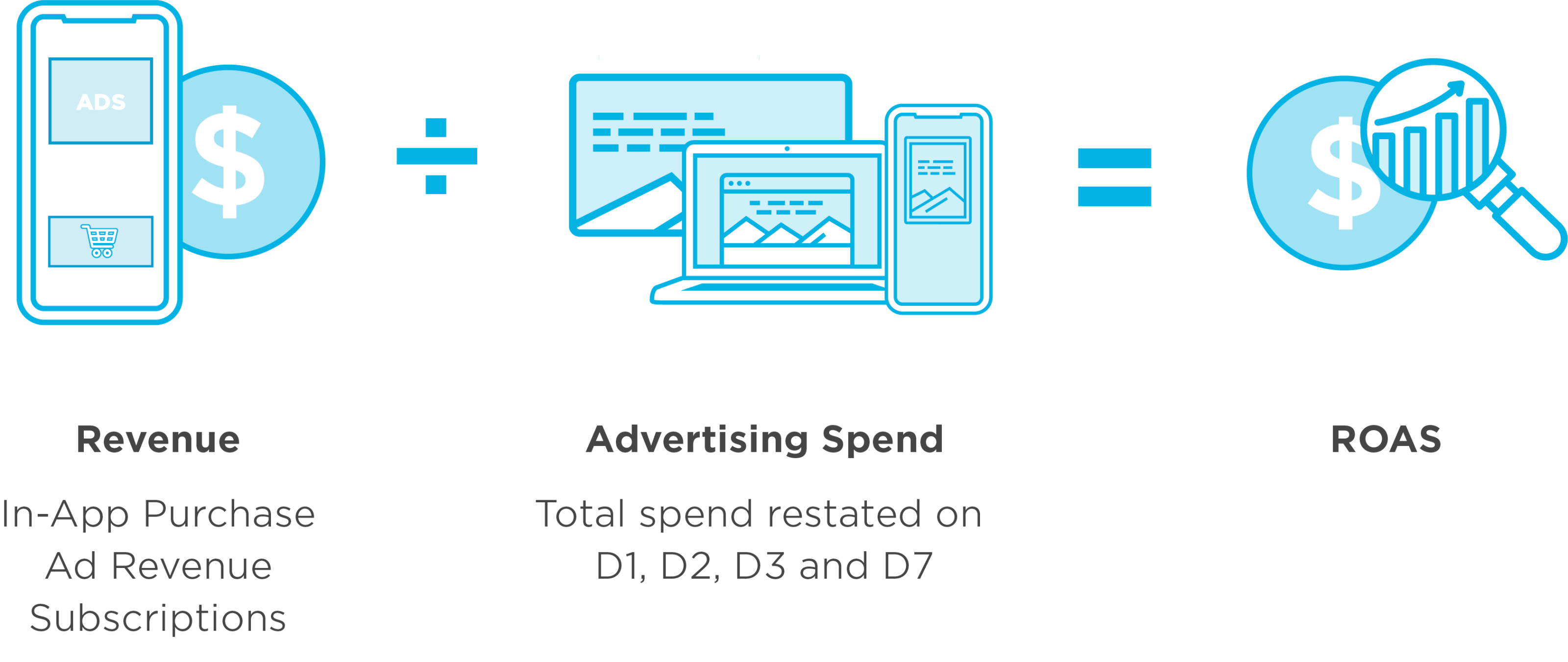Return on ad spend (ROAS), pronounced “row-as”, measures the effectiveness of digital ad campaigns and determines what advertising methods are working to help marketers improve future campaigns.
How to calculate ROAS
You can calculate ROAS by dividing the revenue gained from an ad campaign by the cost of the same campaign.
ROAS = Revenue/ Advertising Cost
For example, a company runs an ad campaign for one month costing $1,500. At the end of the month, the revenue gained from the campaign is $9,000. The return on ad spend from this campaign is $9,000 divided by $1,500, equalling $6.
6 = 9,000 / 1,500
This means that for every dollar spent on advertising, the company gained $6 worth of revenue.
In this example, the ROAS calculation is broad; however, the ROAS metric can also be specific and focus on the spend and revenue of a certain area of a campaign, such as the creative spend or the cost from a specific platform.
Keep in mind that measuring ROAS alone doesn’t show the whole picture of the success of a campaign. Other factors play into a campaign’s effectiveness, such as the goals of the company or costs not associated with the campaign specifically. That is why there is no standard target ROAS number. Each company is different when it comes to how much money they need to incur from a campaign. Companies with large marketing budgets might be okay with a smaller profit margin, but other companies might need larger margins.
ROAS vs ROI
Both return on investment (ROI) and ROAS are common marketing metrics to understand campaign performance.
ROI measures the profit from each investment and is calculated by dividing net profit by the overall investment. For example:
Net profit / total investment = total revenue-total investment / total investment = ROI
ROI is a general metric that you can apply to most campaign expenses while ROAS is specifically for ad spend.
Why ROAS is important
It is beneficial to calculate your return on ad spend to determine if an ad campaign was successful and if the money and time spent on the campaign were worth it. If the campaign is not performing as expected, a company should stop or alter the campaign as soon as possible to counter the lost money of the ineffective campaign.
A company can combine ROAS with other metrics such as a user’s lifetime value (LTV) to help determine future campaign budgets and marketing strategies.
Return on ad spend not only shows the profitability of a campaign, but it gives insights into:
- Which marketing channels are the most effective
- The type of content an audience is more responsive toward
- The most profitable times to run a specific campaign
These are just a few benefits of measuring ROAS, all of which can influence where a company focuses its ad spend in the future. To fully understand the ROAS of a campaign, a company should utilize a service that can help gather, measure, and analyze all of its ad campaign data.
Gain maximum return on ad spend with Kochava
A service like Kochava, a mobile measurement partner (MMP), supplies marketers with tools that bring together all the components of the ROAS formula. Marketers can connect the dots of their ad spend with measurement, revenue, and user/customer LTV for the most accurate ROAS result.

With the latest Kochava Cost tool, marketers can view the revenue gathered from in-app purchases, ad revenue, subscriptions, and ad spend from their campaigns, (restated at D1, D2, D3, and D7 for maximum accuracy). By dividing these metrics, you can get the most exact ROAS calculation.
By collecting and measuring all data points in one place, marketers will have a better understanding of their campaign performance, allowing them to optimize future campaigns and improve overall return on ad spend for future campaigns.
Have questions about how Kochava can improve your ROAS? Contact us at support@kochava.com or visit us at kochava.com.



